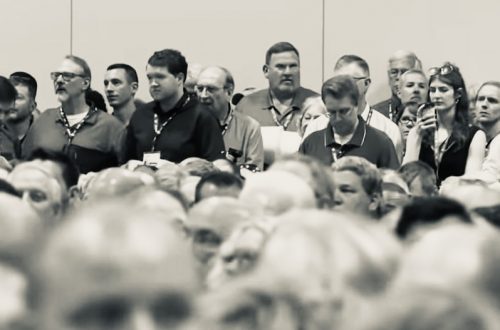Some of you know that the SBC has been having an important internal discussion about churches with female pastors. Our doctrinal statement is clear that while both men and women are gifted for ministry, the office of pastor/elder/overseer is limited to men as qualified by scripture. That view was hard-won through the conservative resurgence of the 1980’s and 1990’s and was decisively inscribed in our confessional standard in the year 2000.
That view was also overwhelmingly reaffirmed in our annual meeting last month in New Orleans as the convention voted to remove two churches with female pastors—one church with female pastors in associate positions and another with a female senior pastor. Moreover, the convention voted overwhelmingly to adopt an amendment to the SBC Constitution which reaffirms our long-held position, that a church in friendly cooperation “affirms, appoints, or employs only men as any kind of pastor or elder as qualified by Scripture.”
Nevertheless, there are some within our convention who make the case that the SBC should include churches that do not agree with our stated convictions on this matter. For example, former SBC president J.D. Greear recently penned an article against the newly approved amendment, arguing that it violates church autonomy and is “inconsistent with our past practice.” He writes:
I do oppose this amendment because it binds the hands of the Credentials Committee from differentiating between those churches who have committed (to use Al Mohler’s words) a “grievous error” (in this case, rejecting complementarianism) and those who I believe simply have a nomenclature problem. Since the Conservative Resurgence, we have sought to be united on primary things (e.g. salvation by faith alone, the bodily resurrection of Jesus, the inerrancy of the Bible, etc.) and secondary things also (e.g. complementarianism, believer’s baptism, regenerate church membership, etc.). This amendment, however, makes conformity on a tertiary thing (right nomenclature of an office) a standard for fellowship…
Our history would say that those who clearly affirm complementarianism—even as they confuse the labeling of certain offices—are still “closely identified” with us. We have a long history of office confusion that demonstrates that.
What is interesting here is that Greear concedes that it is an error for churches to call female pastors—senior, associate, or otherwise. Nevertheless, Greear argues that instead of asking those churches to align their titles with our statement of faith, the SBC should have governing documents that make room for the error. He says that if we fail to cooperate with churches making this error, then we jeopardize our Great Commission work.
Greear raises what any honest observer would have to recognize as grave concerns about this amendment. So it really matters whether his characterization of the amendment is accurate. I believe it’s not. In fact, I am convinced that his description of the amendment misses the mark by a wide margin, and I want to explain why.
But before doing that, I should say that I consider Greear to be a friend. I have been greatly encouraged to hear about some wonderful fruit coming out of The Summit Church in North Carolina. They are an evangelistic, forward-leaning, mission-centered church. I am grateful for all the faithful ministry that he and the Summit Church are doing. While I disagree with him about the amendment, I believe that this is a prudential disagreement between complementarian brothers. Greear and others have called for patient dialogue about this issue, so I hope my words here will be received in that spirit.
Here’s why I think Greear is mistaken about the amendment:
1. Greear reduces the matter to a “nomenclature problem.” As we saw in New Orleans with Saddleback and Fern Creek, there are at least some churches with female pastors that know full well they are out of step with the Baptist Faith & Message (BF&M). They think that the SBC is wrong to say that pastors should be men as qualified by Scripture. In New Orleans, we all heard with our own ears from two churches who were willing to make the case for female pastors on the floor of the convention. For these churches, this wasn’t just a “nomenclature problem.” It was a Bible problem, and Southern Baptists voted overwhelmingly to stick with the Bible.
It should be noted that the only reason we voted on Saddleback in New Orleans is because the Credentials Committee declined to make the recommendation a year earlier in Anaheim. They explained to messengers at the time that they needed clarity about what a pastor is before taking any action. This amendment provides the clarity that they were asking for a year ago. It says that a cooperating church is one that “affirms, appoints, or employs only men as any kind of pastor or elder as qualified by Scripture.” The messengers in New Orleans voted overwhelmingly to give that clarity to the Credentials Committee, and we would do well to repeat that vote in Indianapolis next June.
2. It is a mistake to say that this amendment prevents the Credentials Committee from exercising “latitude or discernment.” To be sure, there are churches in the convention for whom the matter really is merely a nomenclature problem. They have perhaps undergone some “concept creep” with the word pastor. They have appointed female associate “pastors” who aren’t functioning as elders but who nevertheless have the title “pastor.” If the Credentials Committee discovers a mere “nomenclature problem” and the church is willing to correct the problem, then there would be no need to recommend removal. There is nothing in the amendment that forces the Committee to recommend the removal of a church that is willing to rectify the situation. Indeed, if the Committee were to recommend removing such a church, the messengers would no doubt reject that recommendation. I know I would.
Many SBC churches with female pastors in associate positions are not self-consciously trying to drift toward egalitarianism. Rather, they have made an honest mistake about what the term “pastor” means. Many women holding these titles aren’t doing the functions of a pastor (e.g., shepherding the whole congregation) but rather are serving in a ministry that is completely appropriate for gifted women to serve in (e.g., women’s ministry or children’s ministry). I don’t want those churches to leave the convention. I don’t want those women to abandon their important work. But I am praying that such churches might reconsider whether their titles reflect what Baptists historically have believed a pastor to be. The amendment could bring clarity to such churches and foster greater unity within the SBC as whole.
3. It is wrong to treat open defiance of the BF&M as a “nomenclature problem.” This is how Greear says it:
The problem with this amendment is not that it gives churches no space to change their nomenclature, the problem is in what it mandates that we do if they don’t. Complementarian churches with inaccurate titling for some of their women in ministry are put into the same category as those harboring known sex abusers or marrying gay couples. Southern Baptists may well end up pushing away some churches that are actually with us theologically but choose to use a term that most of us believe is not biblically accurate for a particular ministry role– just as if they were either unrepentant racists or had embraced gay marriage.
That doesn’t feel right. It doesn’t feel right because this level of enforced stricture has never been true of our “rules of cooperation.”
In fact, I’d suggest that for those to whom it does feel right, perhaps they are the ones who aren’t “closely identified” with us.
Greear is describing a situation in which a church has heard from the Credentials Committee and has been given a chance to rectify the problem but then chooses not to. This is a church that is doubling-down on female pastors, not a church that is unaware of what they are doing. Greear reduces this to a mere “nomenclature problem” with no great theological consequence. He says that such churches are actually “with us theologically.” We have to ask in what sense they are “with us theologically” when they are knowingly defying the BF&M concerning female pastors. This doesn’t make any sense.
The amendment does not in fact make egalitarianism the moral equivalent of homosexuality, racism, or abuse. No one believes that. That suggestion is a red herring and is nowhere in the text of the amendment. Nor is it in the text of the SBC Constitution. The amendment merely reaffirms that churches in friendly cooperation ought to have biblically qualified men as pastors.
4. It is incorrect to argue that the amendment would violate the autonomy of the local church. Neither the intention nor the actual impact of the amendment would have any effect at all on local church autonomy. The SBC can pass all the amendments, confessions, resolutions, or motions that it wants. None of them have the power to direct any church to do anything. Baptist churches are free now and will always be free to call whomever they wish as pastor. That right is not diminished at all by this amendment. Anyone who thinks the amendment diminishes that right does not understand local church autonomy. The amendment does impact whom the SBC will deem to be in friendly cooperation, but churches remain autonomous in their own sphere. To claim otherwise is misleading.
5. Greear argues that the amendment will threaten the ministries of women who are not serving as pastors. He points to things that have been said online or in blog posts to substantiate his point. But readers need to understand that the amendment says no such thing. The amendment is the amendment. People’s commentary online is not the amendment. We will be voting on the amendment next year in Indianapolis, not on people’s commentary. And the amendment merely reaffirms what the BF&M already says—that the office of pastor should only be filled by qualified men. Anyone who agrees with that should have no problem voting for this amendment.
6. It is a grave mistake to pit doctrinal fidelity against the Great Commission. Greear writes,
I’m tired of micromanaging churches; I want to be about the Great Commission. There are too many people on their way to hell for us to get quagmired in policing each other.
I don’t want to micromanage churches either, and this amendment does not call for that. It simply recognizes that friendly cooperation requires some level of agreement about the qualifications for pastor. Southern Baptists cooperate together for the primary purpose of planting churches both internationally and domestically. That is what we do. Those churches will either have female pastors or not. There is no in-between position. Who we deem to be in friendly cooperation has a direct impact on our Great Commission work. That is why Southern Baptists have chosen to make this a matter of confessional priority. We don’t have to pick between the Great Commission and the Bible’s qualifications for pastor. We can do both, and we are.
7. Greear argues that the SBC has reached an “Acts 15 Moment.” He writes:
In Acts 15, the church was at a crisis point as they tried to figure out what gospel unity looked like among churches that disagreed in some secondary matters. And they appointed a group to come up with a solution that seemed good to them and the Holy Spirit. They recognized that the unity of the church was a serious matter, and they wanted to take time to get it right.
And so, on the Tuesday of the New Orleans Convention, I stood with several former SBC Presidents (James Merritt, Bryant Wright, Steve Gaines, Fred Luter, and Ed Litton) to call for our own Acts 15 moment, as the future of our cooperative mission depends on what we do here. We want to be doctrinally faithful, but we don’t want to change the basis of our cooperation that has been our genius for over a century.
The apostles convened the Jerusalem Council to settle the question of whether the Gentiles had to be circumcised in order to be saved (Acts 15:1). This was not a “secondary” issue. If ever there was a primary issue, this was it. In fact, the apostle Paul says that justification by circumcision is another gospel altogether—one that will damn sinners and not save them (Gal. 1:6-10). In any case, the Jerusalem Council was not about leaders reaching a compromise concerning their disagreements. It was about the church listening to the word of God and obeying the word of God. There was no compromise between error and truth, only obedience to the revealed word of God.
I would argue that Southern Baptists do indeed need to follow the example of Acts 15. We need to listen to what the word of God says, and we need to obey it. In particular, we need to base our cooperation for the Great Commission on obedience to God’s word—including what God says about the qualifications for pastor. If we want God to bless our efforts, that is what we must do. Accommodating error will only divide us. Obeying God’s word will unite us. This amendment helps us to do that, and that is why I support it. I hope and pray that you will too.






